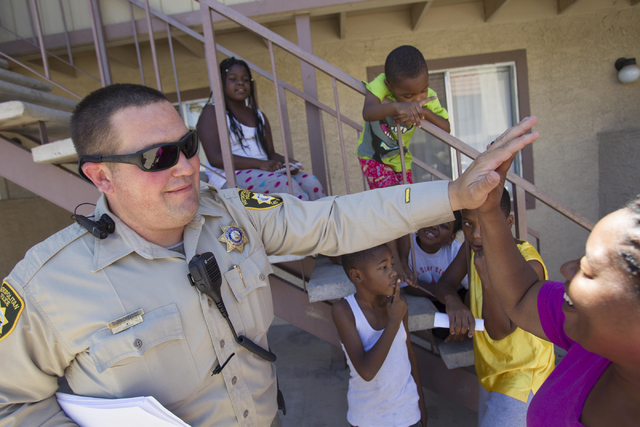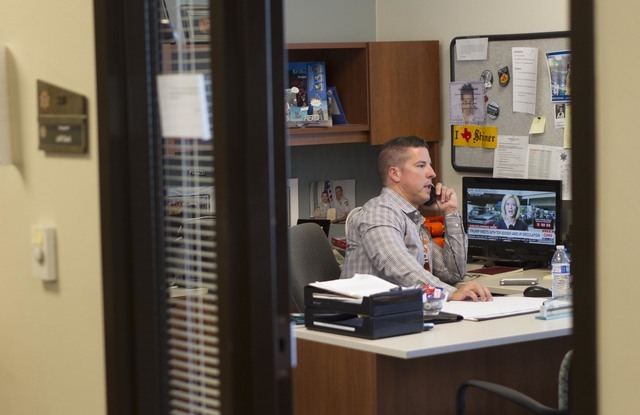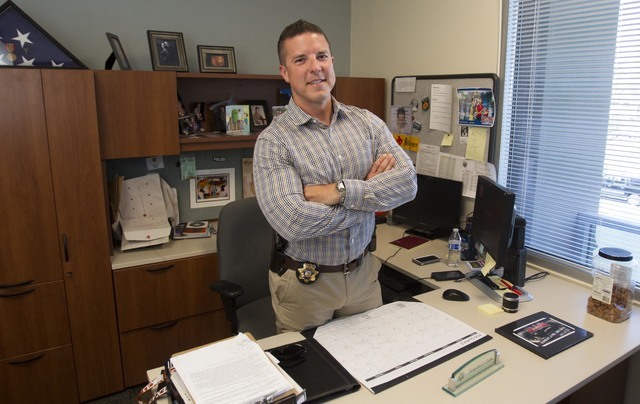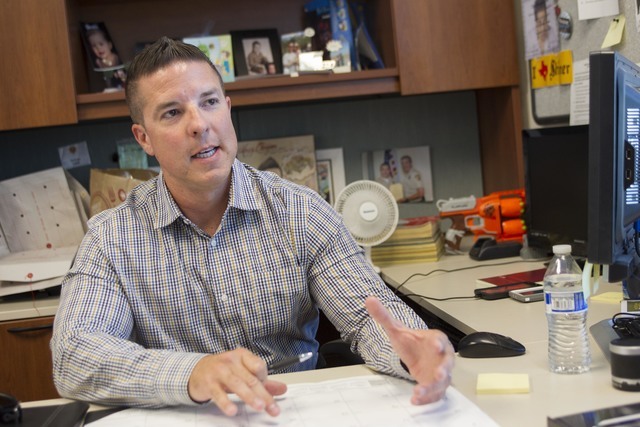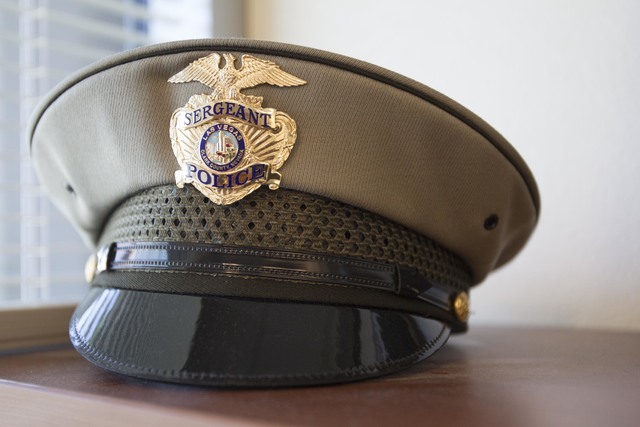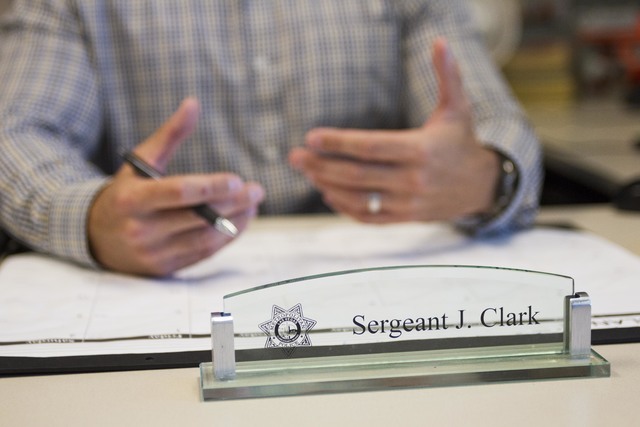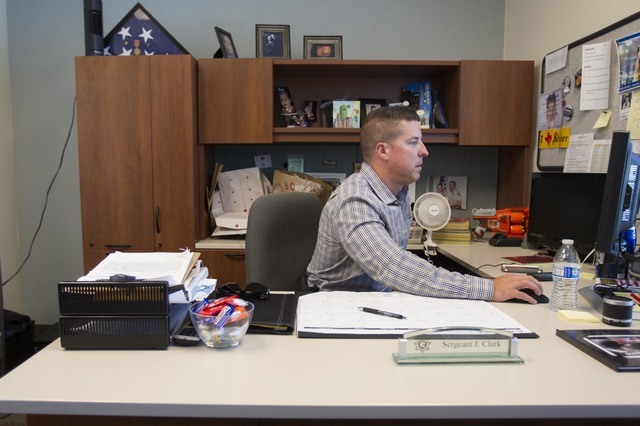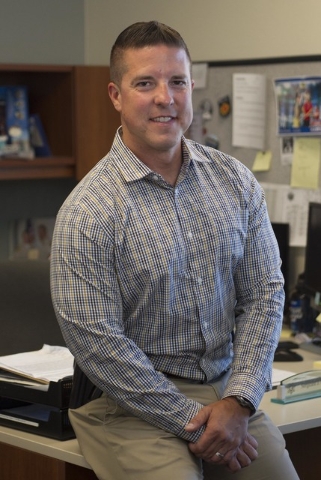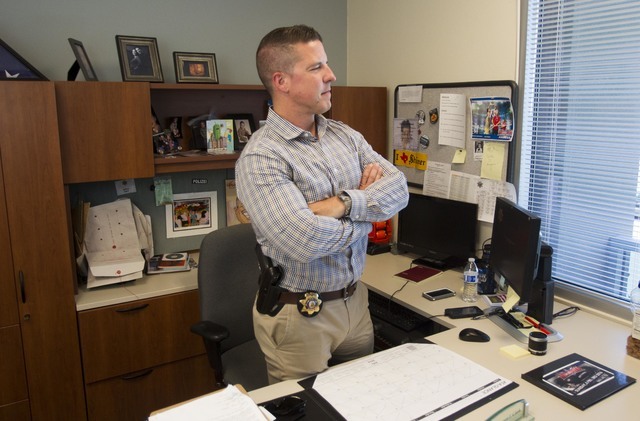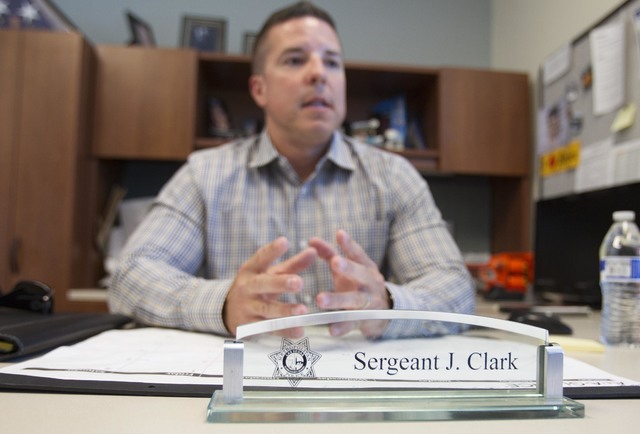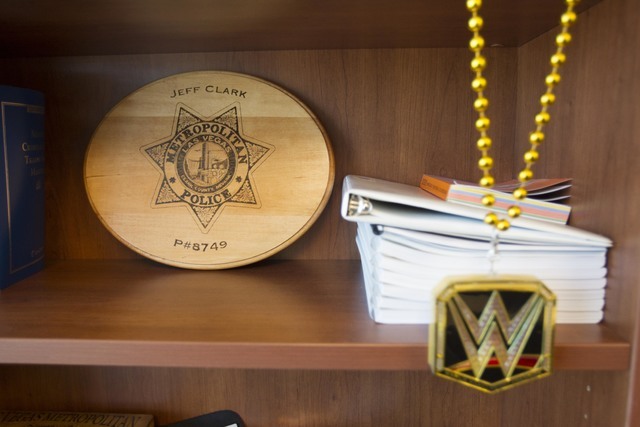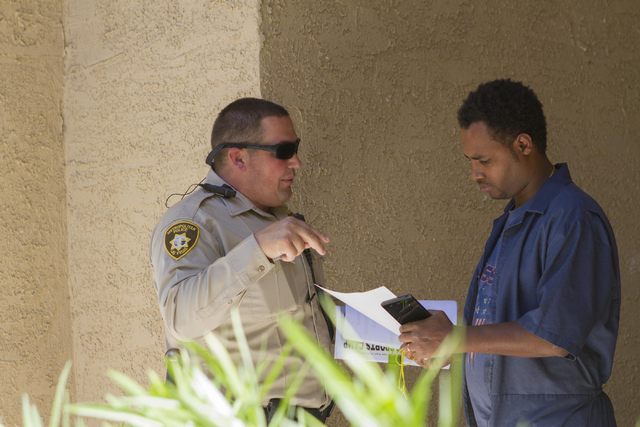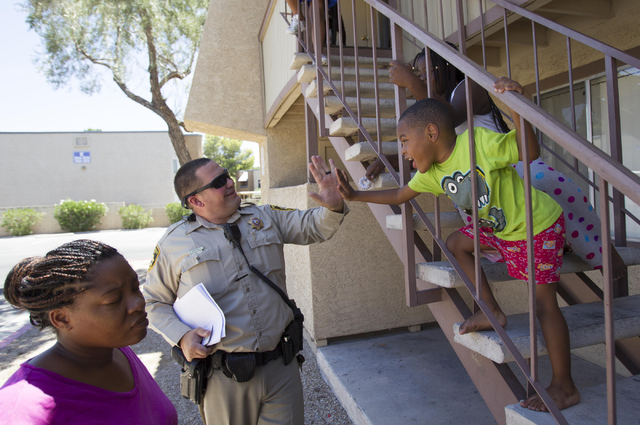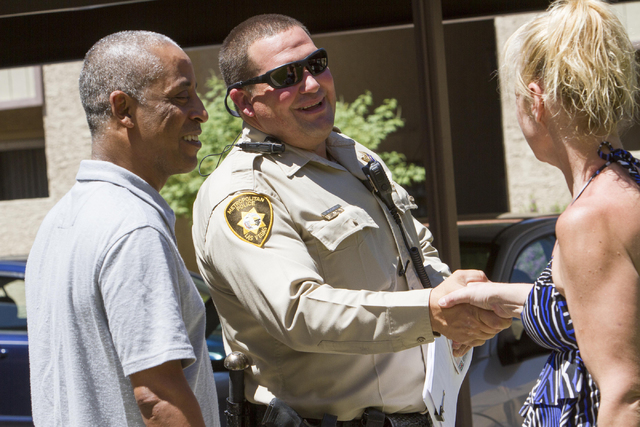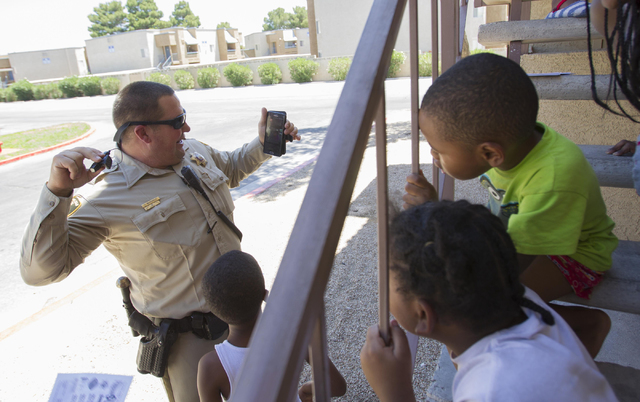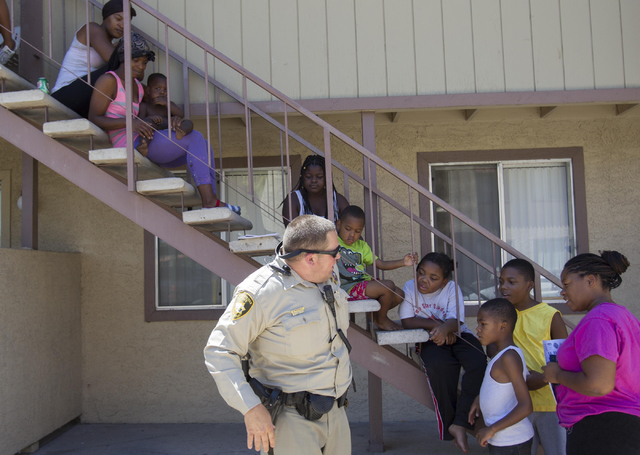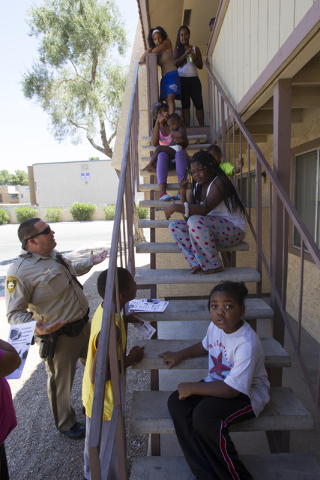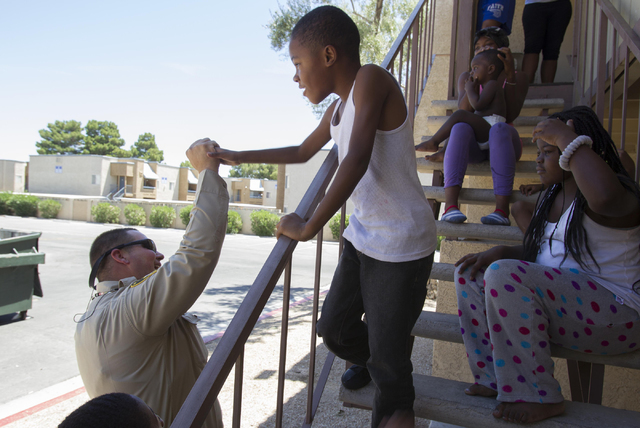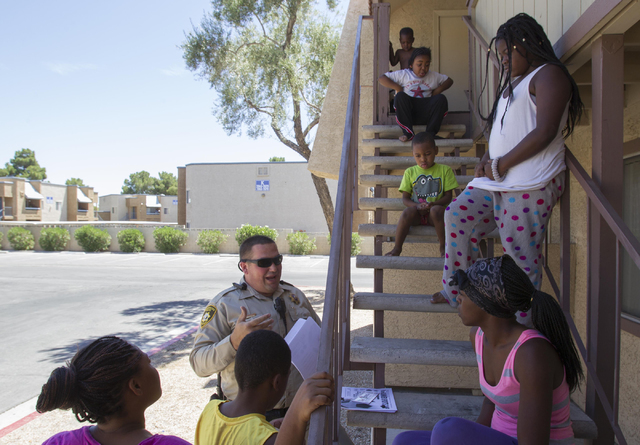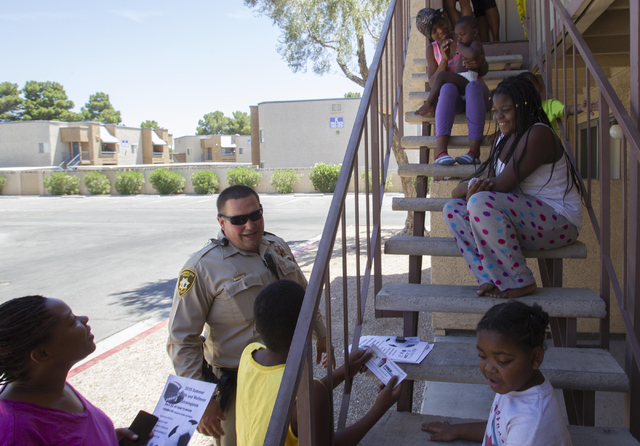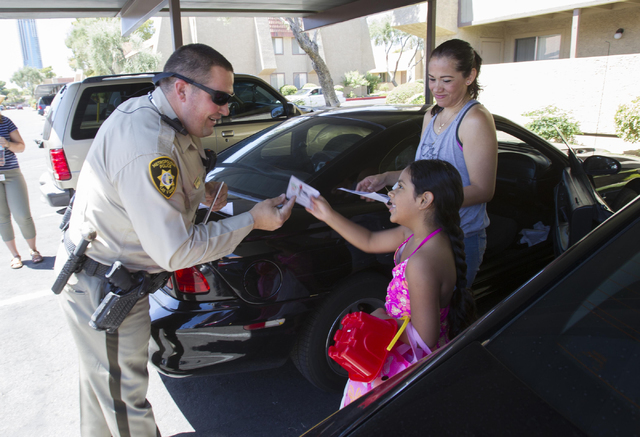Metro community policing efforts help keep the calm
In a sleeveless yellow jersey, Tyriq Beacham stood outside the front door to his family’s second-story, south-central valley apartment Thursday afternoon, hiding from the heat in a sliver of shade.
From the tip-top of the apartment’s stairs, the 12-year-old boy shouted down to his relatives below, who’d just pulled up in a car.
“You yellin’ at me?” Officer Daryl McDonald, with the Metropolitan Police Department, shouted up to the boy from the parking lot.
“No,” Tyriq said quietly.
“You comin’ to my sporting event?” McDonald shouted again, holding a stack of fliers advertising the free youth sports camp he helped plan for the community, scheduled for this week.
“What sport?” Tyriq asked cautiously, curiously.
“How ’bout you come down and see,” McDonald said.
A smile stretched across the boy’s face, and he bolted down the steps. “Is it basketball?” Tyriq yelled in excitement. “I’ll beat you in basketball!”
“He’s too short,” interjected the boy’s mother, Robyn, 30, who was now standing near McDonald, next to her car.
“Nah uh!” the boy yelled.
PROGRESSIVE POLICING
The back-and-forth started as McDonald — a “community-oriented policing” officer — made his rounds Thursday throughout the Silverado Village apartment complex at 3750 S. Arville St., gathering a list of attendees for the planned youth camp.
Officers such as McDonald work separately from patrol officers, he explained, but they can respond to incidents if needed. He has worked as one for about four years.
During McDonald’s four shifts a week, he gets to know the community he polices, conducts crime and demographic research and works with faith-based leaders and cultural groups to form coalitions to collectively tackle community problems.
As an example, McDonald opened the fridge in the Silverado complex’s leasing office.
Red boxes filled with simple, healthy meals stuffed the bottom shelf and a crate of at least 50 small milk cartons sat on the shelf above — free food for residents who can’t afford to keep it on the table.
McDonald helped make that happen.
“We look at high unemployment, people living in close quarters. You have no churches, schools, parks. And the food density is bad,” he said of the area, just north of the Palms. “You look at all these factors, and when you have all these factors at once, they can create violence. People get desperate.”
So McDonald reached out to Three Square, the local nonprofit group that now provides free meals daily at the complex.
“When we bring in this stuff, it’s subsidizing their needs,” he said. “They can put all their money toward rent, and we’ll bring the food.”
KEEPING THE CALM
Metro’s community policing efforts were emphasized July 8, when Sheriff Joe Lombardo addressed the public after the Dallas shooting that left five officers dead and the two fatal, officer-involved shootings of Alton Sterling and Philando Castile.
“It’s unfortunate that most jurisdictions react after a crisis before they decide to bring the community in to seek solutions to the problems,” Lombardo said.
“I’m not saying we’re exempt from that theory, because it happened to us years ago,” the sheriff added. “We realized that, opened our eyes, and as a result we haven’t experienced what you’re seeing in Ferguson, Baltimore and now Dallas,” in terms of large-scale, sometimes violent protests.
Lombardo clarified that the Dallas shooting “had nothing to do with their community policing efforts.”
He instead described the Dallas attack as “a lone individual acting out of hate,” similar to 2014, when two shooters killed Metro officers Alyn Beck and Igor Soldo on their lunch break, along with good Samaritan Joseph Wilcox, 31.
Sgt. Jeff Clark, a department spokesman, said one of the reasons Metro is able to build trust with the community is the effort Metro has made to address the department’s use of deadly force. The department used deadly force at one of the highest rates in the country in the early 2000s for urban police agencies, as detailed in a Review-Journal investigation.
Citizens “peacefully protested, peacefully told us they wanted change,” Clark said. “They talked to the sheriff, so what did Sheriff Gillespie do? He invites the Department of Justice in, and we work on this together with the American Civil Liberties Union, and the National Association for the Advancement of Colored People, and come up with a lot of things.”
“Dallas on that front is also progressive,” Clark said.
Though Metro community-oriented policing officers are separate from Metro patrol officers, the department trains patrol officers to get to know their communities too, Clark said — even new officers are required to complete a community policing project within the first 24 weeks after they graduate from the academy.
“It’ll never solve the problem if you’re only responding to calls,” Clark said. “You’ve got to get to the root of the problem.”
As McDonald joked with Tyriq on Thursday, he handed the boy’s mother a flier about a separate event also scheduled for next week, a farmers market offering thousands of pounds of free produce and opportunities for children to compete in a sporting tournament and parents to enter a raffle for free Regional Transportation Commission bus passes.
After the mother took the flier, McDonald turned back to Tyriq and the small crowd of young siblings and cousins who had filed out of the apartment, sat on the stairs and started listening.
“Anybody know what this is?” McDonald asked the children, pointing at his utility belt. Tyriq’s mother and nearby aunts smiled.
“A Taser!” Tyriq said.
“He got it right!” McDonald said.
“I watch ‘COPS,’” Tyriq said, confident.
The boy then silently pointed at the officer’s gun.
“Yes, that’s my gun,” McDonald said. “What do you do when you see a gun?”
The boy paused. The other children sat quiet for a second. The adults listened.
“Don’t touch it; tell an adult,” McDonald said. “Say it with me.”
As a treat, McDonald turned on his body camera, pulled out his phone and opened an application that let him view the camera’s live feed.
He then handed his phone with the live feed to Tyriq and pointed his body camera at the children.
“Oh that’s me!” Tyriq yelled, watching the phone and waving at the little lens on McDonald’s uniform.
“You didn’t point that thing at me, did you?” the boy’s mother said to McDonald, the other adults laughing.
’AND YOU COME BACK’
As McDonald made his way back to the apartment’s leasing office, he waved at a few passing adults, chatted with the complex’s maintenance supervisor and hugged a little boy who knew him by name.
“It’s a relationship-building thing,” McDonald said. “When you meet someone, and you tell them you’re gonna do something” — like get food in the office or plan an event or check in with children who are having problems with their friends — “you do it. And you come back. And you come back. It’s about consistency.”
Clark said that attitude is encouraged in Metro’s patrol sector, too.
“If I just pull up my phone and look at social media, the sky is falling,” Clark said. “It’s really easy — because we’re human, too — to get stuck in that cynicism: You’re seeing the worst of the worst every day, and then you’re dealing with good people on their worst day.”
He paused, then continued.
“But I think by and large our officers remember the oath that they took and the pride that they had when they got their badge pinned on their chest, and the reasons that they’re doing this — to make a difference and to be pillars of the community. And even in the face of all the rhetoric, I think we do it better than anybody else.”
Review-Journal reporter Wesley Juhl contributed to this story. Contact Rachel Crosby at rcrosby@reviewjournal.com or 702-387-5290. Find @rachelacrosby on Twitter.



